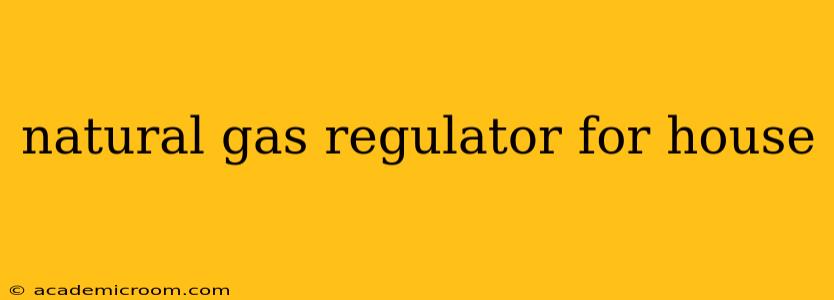A natural gas regulator is a critical safety component in your home's gas system. It controls the pressure of natural gas flowing from the main supply line to your appliances, ensuring safe and efficient operation. Understanding how it works, its importance, and potential problems is vital for homeowner safety and peace of mind. This comprehensive guide will address common questions and concerns about natural gas regulators for houses.
What is a Natural Gas Regulator and How Does it Work?
A natural gas regulator is a pressure-reducing valve that lowers the high pressure of natural gas from the main supply line to a safe and usable pressure for your home appliances. Think of it as a gatekeeper, carefully controlling the flow of gas. It typically sits outside your home, often near the meter, and is connected to the gas supply line. The regulator uses a diaphragm and spring mechanism to maintain a consistent output pressure, even if the input pressure fluctuates. If the pressure gets too high, the regulator automatically reduces the flow, preventing dangerous over-pressurization. Conversely, if the pressure drops, the regulator adjusts to maintain a steady supply.
Where is the Natural Gas Regulator Located in My House?
The natural gas regulator is usually located outside your home, near the gas meter. Its exact location will vary depending on your house's construction and the local gas company's installation practices. You'll often find it mounted on a pipe connected to the meter. It's crucial to be able to locate it for safety inspections and in case of emergencies. It's typically a small, often metallic, device, and might be marked with safety warnings.
What are the Signs of a Faulty Natural Gas Regulator?
Recognizing signs of a faulty regulator is crucial for safety. While you shouldn't attempt repairs yourself, here are some warning signs that necessitate contacting your gas company immediately:
- Unusual Noises: Hissing, whistling, or other unusual sounds emanating from the regulator could indicate a leak or malfunction.
- Low Gas Pressure: If your appliances are underperforming (e.g., weak flames on your stovetop, poor furnace operation), a faulty regulator might be restricting gas flow.
- Gas Smell: A strong gas odor, even without a noticeable leak, warrants immediate attention, as it might indicate a regulator problem affecting pressure control.
- Visible Damage: Any visible damage to the regulator, such as cracks or corrosion, requires immediate professional attention.
How Often Should I Have My Natural Gas Regulator Checked?
While the frequency of regulator inspections may vary based on local regulations and gas company recommendations, it's generally advisable to have your gas system, including the regulator, checked annually by a qualified professional. Regular inspections are crucial for early detection of potential issues and ensuring continued safe operation.
How Much Does it Cost to Replace a Natural Gas Regulator?
The cost of replacing a natural gas regulator can vary significantly depending on factors like the regulator's type, your location, and the labor costs involved. It’s best to contact your local gas company for an accurate quote. However, the cost of replacement is far outweighed by the safety benefits it provides.
Who Should I Contact if I Suspect a Problem with My Regulator?
If you suspect a problem with your natural gas regulator, contact your local gas company immediately. Do not attempt to repair or adjust the regulator yourself. Gas leaks and pressure problems are serious safety hazards, and only qualified professionals should handle them. Your safety should always be the top priority.
Can I Replace My Natural Gas Regulator Myself?
No. Replacing a natural gas regulator is a complex task that should only be performed by qualified, licensed gas technicians. Improper installation can lead to dangerous gas leaks and potential explosions. Always contact a qualified professional for any repairs or replacements related to your natural gas system.
This guide provides valuable information regarding natural gas regulators. Remember: safety always comes first. Contact a qualified professional for any concerns related to your gas system. Never attempt DIY repairs.
